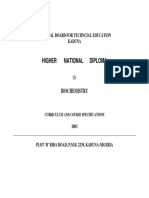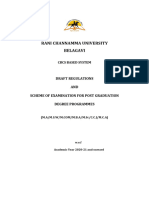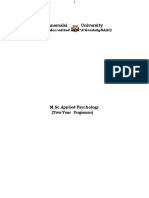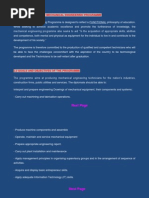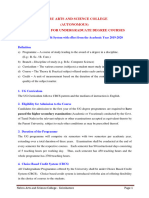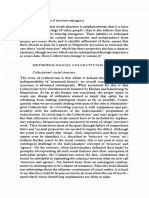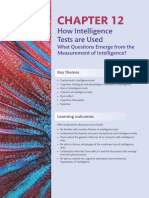MA Economics Collaborative Programme With The African Economic Research Consortium - SH540
MA Economics Collaborative Programme With The African Economic Research Consortium - SH540
Uploaded by
priyaramgatiCopyright:
Available Formats
MA Economics Collaborative Programme With The African Economic Research Consortium - SH540
MA Economics Collaborative Programme With The African Economic Research Consortium - SH540
Uploaded by
priyaramgatiOriginal Title
Copyright
Available Formats
Share this document
Did you find this document useful?
Is this content inappropriate?
Copyright:
Available Formats
MA Economics Collaborative Programme With The African Economic Research Consortium - SH540
MA Economics Collaborative Programme With The African Economic Research Consortium - SH540
Uploaded by
priyaramgatiCopyright:
Available Formats
MA Economics Collaborative Programme with the African Economic Research
Consortium - SH540
1. Context and Objectives
This is a high-calibre, 2-year part-time Masters programme in Economics offered by the
University of Mauritius in close collaboration with the African Economic Research Consortium
(AERC – website: www.aercafrica.org), a public, non-profit-making organization devoted to
advanced economic research and training, based in Nairobi, Kenya. Students will spend the first
year at the University of Mauritius, where they will take 4 core modules and sit for the
examinations. On successful completion of the core modules, students will travel to Nairobi
around late June to take 2 elective modules over one semester (3 months) at the Joint Facility for
Electives (JFE). Finally, they will return to the University of Mauritius to prepare their MA thesis
during the 4th semester.
All fees relating to the programme are payable to the University of Mauritius. However, the
AERC, as per past practice, will meet tuition costs for all students at the JFE, Nairobi. In
addition, the AERC will take care of the travel and accommodation costs for students not
sponsored by their employer. The JFE is a modern campus, complete with dorms, computer labs
and sports facilities, including a swimming pool, and is well secured. All meals are provided free
of charge in buffet style, catering for a variety of dietary preferences. The AERC provides health
coverage to all students and offers a modest stipend for incidental expenses.
This programme offers solid training in economics and is targeted to those who intend to work as
economists, teachers/lecturers or consultants in the private or public sector as well as those who
wish to pursue a PhD in economics. It provides an excellent opportunity for Mauritians to mix
with students of different cultures and interact with African and international professors.
The objectives of the MA Economics programme are:
To provide advanced training in economic theory and methods to prepare individuals for key
positions of responsibility in policy analysis and economic management in Government as well
as in the private sector and institutions of higher learning.
To prepare a select group of individuals for doctoral-level work through rigorous training in
theory, methods and applications.
To develop the ability to identify problems and the capacity for decision-making, leading to
practical solutions.
To enhance the individual’s capacity to meet emerging challenges within an organisation with a
view to increasing domestic and international competitiveness in a rapidly changing global
environment.
2. Learning Outcomes
On completion of the programme, students should be able to:
Relate to advanced microeconomics and macroeconomics principles.
Apply quantitative techniques and research methods.
Formulate mathematical economic models and quantify model parameters from data.
Use econometric and mathematical techniques.
Evaluate existing economic models for theoretical and practical problem solving.
Undertake applied work and research projects in economics.
1 © University of Mauritius 2015, 2019
Analyse relevant literature in different areas namely international and financial economics,
public economics, development economics, labour and monetary economics, amongst others
and draw the connection between theory and empirical conditions.
3. Teaching and Learning Methods
As far as possible, a blended approach will be used. These might include among others: face to
face lectures, e-learning (moodle), problem based learning, case studies, document analysis,
practical lab sessions (where applicable), assignments, seminars, tutorials, open learning materials,
textbooks and independent study as well as collaborative learning.
4. Entry Requirements
General
Successful completion of an undergraduate degree with
(i) at least a Second Class or 50%, whichever is applicable or
(ii) a GPA not less than 2.5 out of 4 or equivalent, from a recognised higher education
institution.
Or alternative qualifications acceptable to the University of Mauritius
Programme Specific
At least a Second Class Honours Degree in Economics, or any other social science discipline of
which Economics is a major component, or alternative qualifications acceptable to the
Department of Economics and Statistics, from a recognised University.
General and Programme Requirements - Special Cases
The following may be deemed to have satisfied the general and programme requirements for
admission:
(i) Applicants who do not satisfy any of the requirements as per Regulations above but who
submit satisfactory evidence of having passed examinations which are deemed by the
Senate to be equivalent to any of those listed.
(ii) Applicants who do not satisfy any of the requirements as per Regulations above but who
in the opinion of Senate submit satisfactory evidence of the capacity and attainments
requisite to enable them to pursue the programme proposed.
(iii) Applicants who hold a full practising professional qualification obtained by
examination.
5. Programme Duration
Minimum: 2 years; Maximum: 4 years
2 © University of Mauritius 2013, 2015, 2019
6. Minimum LCCS Credits Required for Degree Award: 90
Core Electives Dissertation Total
Master Degree 48 24 18 90
Postgraduate Diploma 48 24 - 72
Postgraduate Certificate 48 _ _ 48
For Each Academic Year
Year LCCS Credits
1 48
2 42
Total 90
7. Assessment and Deadlines
Continuous and Written Assessment of Modules
All core modules will be taught over the course of two semesters, and examined at the University
of Mauritius at the end of the academic year. Upon successful completion of the core modules,
students will, in the month of July, travel to Nairobi to take two elective modules over one
semester in a centralised facility, called the Joint Facility for Electives (JFE). The continuous
assessment and written exams for the two electives will take place at the JFE.
Students are expected to return to the University of Mauritius to commence work on their thesis
or research paper, the successful completion of which may take between 6 to 12 months.
For the core modules taken at the University of Mauritius:
(i) Continuous assessment can be based on seminars and/or assignments and shall include at
least 1 class test.
(ii) The continuous assessment will count for 40 to 50% of the overall percentage mark of the
module(s). Examinations will count for 50 to 60% of the overall percentage mark of the
module(s).
(iii) No retake examinations will be organised. Instead, students will be allowed to carry
forward a maximum of three modules at any point in time and will be allowed to sit for
the examinations with the next cohort of students.
(iv) All modules carry their own credit value.
(v) All modules will be run after 2.00 p.m.
Electives Modules taken in Nairobi
For a student to pass a module, a minimum of 50% should be attained.
3 © University of Mauritius 2013, 2015, 2019
Submission Deadlines for Dissertation
First Draft: End of July in the Final Year
Final Copy: Last working day of August in the Final Year by 4 p.m. at latest
Three copies of the dissertation (two spiral-bound copies and one soft copy in a single PDF text file
on electronic storage media) should be submitted to the Faculty/Centre Registry and in addition, a
soft copy of the dissertation in a single PDF text file should be uploaded on the “‘Turnitin’
Platform” in the final assignment submission link indicated by the Programme/Project Coordinator.
Repeat and Termination of Registration
If the CPA of a student is < 40% for an academic year, s/he will have to repeat the entire
academic year, and retake modules as and when offered. However, s/he will not be required, if
s/he wishes, to retake modules for which Grade C or above has been obtained.
Students will be allowed to repeat only once over the entire duration of the Programme of
Studies.
Registration of a student will be terminated if
(i) the CPA < 40% at the end of an academic year and the student has already repeated one
year of study; or
(ii) the maximum duration allowed for completion of the Programme of Studies has been
exceeded.
4 © University of Mauritius 2013, 2015, 2019
8. List of Modules
CODE MODULE NAME Contact Self Other LCCS
Hrs Study learning Credits
L + P+T
CORE MODULES
ECON 5013 Advanced Microeconomics 60 120 180 12
ECON 5022 Advanced Macroeconomics 60 120 180 12
ECON 5023 Quantitative Methods 60 120 180 12
ECON 5024 Research Methods and 60 120 180 12
Computer
Applications
ECON 6000 Dissertation 18
ELECTIVES (offered at the JFE Nairobi)
AERC 6001 Agricultural Economics 12
AERC 6002 Corporate Finance and Investment 12
AERC 6003 Econometrics Theory and Practice 12
AERC 6004 Environmental Economics 12
AERC 6005 Game Theory and 12
Information
Economics
AERC 6006 Health Economics 12
AERC 6007 Industrial Economics 12
AERC 6008 International Economics 12
AERC 6009 Labour Economics 12
AERC 6010 Managerial Economics 12
AERC 6011 Monetary Theory and Practice 12
AERC 6012 Public Sector Economics 12
Note: Contact hours for the electives vary from one elective to another. On average, they range from 7 to
8 hours a week over 14 weeks.
5 © University of Mauritius 2013, 2015, 2019
9. Programme Plan – MA Economics (Collaborative)
YEAR 1
CODE MODULE NAME Contact LCCS
Hrs Credits
L + P+T
CORE MODULES
ECON 5013 Advanced Microeconomics 30 12
ECON 5022 Advanced Macroeconomics 30 12
ECON 5023 Quantitative Methods 30 12
ECON 5024 Research Methods and Computer 30 12
Applications
SUB TOTAL 48
YEAR 2
CODE MODULE NAME Hrs/Wk LCCS
L + P+T Credits
ECON 6000 Dissertation 18
ELECTIVES Choose ANY 2 from the following 12 electives (Note: These electives are offered
at the JFE in Nairobi):
AERC 6001 Agricultural Economics 12
AERC 6002 Corporate Finance and Investment 12
AERC 6003 Econometrics Theory and Practice 12
AERC 6004 Environmental Economics 12
AERC 6005 Game Theory and Information 12
Economics
AERC 6006 Health Economics 12
AERC 6007 Industrial Economics 12
AERC 6008 International Economics 12
AERC 6009 Labour Economics 12
AERC 6010 Managerial Economics 12
AERC 6011 Monetary Theory and Practice 12
AERC 6012 Public Sector Economics 12
SUB TOTAL 42
TOTAL 90
6 © University of Mauritius 2013, 2015, 2019
You might also like
- ND Welding & Fabrication (1) NbteDocument76 pagesND Welding & Fabrication (1) NbteAkinbuwa Peter50% (2)
- Component 1 As English Language Annotated Examples 2022Document24 pagesComponent 1 As English Language Annotated Examples 2022Anvita NazarethNo ratings yet
- My Activity Book Yrs 7 11 PDFDocument104 pagesMy Activity Book Yrs 7 11 PDFmadhujayanNo ratings yet
- 4319B - Flank Modifications in Bevel Gears Using A UMCDocument22 pages4319B - Flank Modifications in Bevel Gears Using A UMCRaul PerezNo ratings yet
- NA To SS EN 1992-2-2012Document23 pagesNA To SS EN 1992-2-2012Dushyant Gupta100% (1)
- 3084bcom22Document98 pages3084bcom22gauravking9151No ratings yet
- Mba Syllabus Telangana UniversityDocument33 pagesMba Syllabus Telangana Universityabdulraheen818No ratings yet
- Circular Regarding Online-Open Distance Learning (ODL) SOP From 2023-24Document17 pagesCircular Regarding Online-Open Distance Learning (ODL) SOP From 2023-24abhishekarvindparmar1No ratings yet
- MBA - ITL Regulation & Syllabus 27.7.22 (1)Document86 pagesMBA - ITL Regulation & Syllabus 27.7.22 (1)Prashanth NairNo ratings yet
- Summary of All ProgrammesDocument376 pagesSummary of All ProgrammesUmar Muhammad100% (3)
- HND Marine EngDocument107 pagesHND Marine EngGoroth goodluckNo ratings yet
- Mba Hospital and Health Care Management 2021 1Document65 pagesMba Hospital and Health Care Management 2021 1csshdigitalNo ratings yet
- Biochem HNDDocument130 pagesBiochem HNDCHIEMEZIEM NJOKU100% (1)
- 3206imguf CourseStructureSyllabus B.tech 2022-26 CEDocument166 pages3206imguf CourseStructureSyllabus B.tech 2022-26 CEkhushalcloudNo ratings yet
- MHA New CurriculumDocument64 pagesMHA New CurriculumRaja RamNo ratings yet
- ND & HND Mass CommunicationDocument365 pagesND & HND Mass Communicationebraheem636100% (1)
- App MathDocument41 pagesApp MathPriya SriramNo ratings yet
- Mca SyDocument100 pagesMca SyStar BawaNo ratings yet
- MBA (ITLM) Syllabus 2022Document86 pagesMBA (ITLM) Syllabus 2022Chetan Randev100% (1)
- 1865imguf BTCSE Course Structure and Syllabus Batch 2020 2024Document108 pages1865imguf BTCSE Course Structure and Syllabus Batch 2020 2024saurabh.biet.11No ratings yet
- M.SC MathematicsDocument83 pagesM.SC Mathematicsgomathi baskarNo ratings yet
- M.Ed. Curriculum: With Effect From The Academic Year 2006 - 07Document68 pagesM.Ed. Curriculum: With Effect From The Academic Year 2006 - 07arunabhatlaNo ratings yet
- ProspectusDocument39 pagesProspectusVandemarkNo ratings yet
- 220104manual of Rules For - UGDocument14 pages220104manual of Rules For - UGĐhřüv .ČNo ratings yet
- MBA New SyllabusDocument87 pagesMBA New SyllabusnaveenNo ratings yet
- PG Handbook NewestDocument66 pagesPG Handbook Newesthunteryemi7No ratings yet
- Gen PeriyarDocument147 pagesGen PeriyarLibrary M.SelvamNo ratings yet
- StudentsHandbook 2017 18 Ver 3Document32 pagesStudentsHandbook 2017 18 Ver 3Jaseel Hassan KNo ratings yet
- CBCS LLM 2019Document53 pagesCBCS LLM 2019HoneyNo ratings yet
- SC320cFDocument12 pagesSC320cFirfaankhodabocus1608No ratings yet
- PG CBCS Draft Regulation-2020-21Document30 pagesPG CBCS Draft Regulation-2020-21dhupadpraveen00No ratings yet
- Revised Mba Course - 2007Document88 pagesRevised Mba Course - 2007Vishal Vikram NaikNo ratings yet
- BBA Regulations RevDocument68 pagesBBA Regulations Revbbanotes79No ratings yet
- Ug RegulationsDocument43 pagesUg RegulationsMahesh MaheshNo ratings yet
- IcfaiDocument20 pagesIcfaiabhishek398120% (1)
- PG Curriculum and Syllabus-2015 (PT) - (Mapped)Document74 pagesPG Curriculum and Syllabus-2015 (PT) - (Mapped)suresh693No ratings yet
- Postgraduate Programme (MBA 2 Yrs) - Academic Regulations 2021Document23 pagesPostgraduate Programme (MBA 2 Yrs) - Academic Regulations 2021DEEPANo ratings yet
- Btee 2023 27Document141 pagesBtee 2023 27saurabh.biet.11No ratings yet
- Draft NEP Rules FYUGP 2024Document30 pagesDraft NEP Rules FYUGP 2024arkabasak62No ratings yet
- MSC Appliedpsychology2019-20Document65 pagesMSC Appliedpsychology2019-20AV GaneshNo ratings yet
- 2018 ECE UG Handbook1Document84 pages2018 ECE UG Handbook1davidshoyemmy2022No ratings yet
- Alagappa Chettiar College of Engineering & Technology KARAIKUDI - 630 003Document64 pagesAlagappa Chettiar College of Engineering & Technology KARAIKUDI - 630 003MaduraveluNo ratings yet
- Sagar Notes Dada Work ScienceDocument5 pagesSagar Notes Dada Work Scienceshree JadhavNo ratings yet
- Distance RulesDocument19 pagesDistance RulesAftab HashmiNo ratings yet
- 1633098521_331775605_Curriculum_MBS Revised course_2065Document122 pages1633098521_331775605_Curriculum_MBS Revised course_2065samikchasubedi222No ratings yet
- Maths Syllabus 2014 15Document50 pagesMaths Syllabus 2014 15Velan VelanNo ratings yet
- R23 RegulationsDocument24 pagesR23 Regulationsmohithman2005No ratings yet
- New Teacher Education Curriculum - Effective February 2024Document198 pagesNew Teacher Education Curriculum - Effective February 2024munaxemimosa8No ratings yet
- Syllabus For Aeronautical Engineering HiDocument171 pagesSyllabus For Aeronautical Engineering HirjkrtshNo ratings yet
- Aicte Syllabus 2018Document71 pagesAicte Syllabus 2018Vishal K. DhimanNo ratings yet
- BBA (1)Document50 pagesBBA (1)nagarajbs88No ratings yet
- Kuvempu University NEP Model Regulations 2021-UG & PGDocument30 pagesKuvempu University NEP Model Regulations 2021-UG & PGkrishnamoorthih371No ratings yet
- 2181imguf - 2BTCSE Batch2021 25Document174 pages2181imguf - 2BTCSE Batch2021 25anon_467865899No ratings yet
- 2024 Academic ProgrammesDocument12 pages2024 Academic Programmesgurirassaima387No ratings yet
- UG-Ordinance-2023_030824 (1)Document16 pagesUG-Ordinance-2023_030824 (1)wwe62345No ratings yet
- B.tech DTDP Final 7-2-2019-1Document124 pagesB.tech DTDP Final 7-2-2019-1Maheshwari KarlaNo ratings yet
- 1.0 Philosophy of The Mechanical Engineering Programme: Next PageDocument12 pages1.0 Philosophy of The Mechanical Engineering Programme: Next PageayariseifallahNo ratings yet
- Implementation NEP 2020Document13 pagesImplementation NEP 2020Som VermaNo ratings yet
- Madurai Kamaraj University: Appendix - AbDocument110 pagesMadurai Kamaraj University: Appendix - AbRekha BNo ratings yet
- Regulations 2019Document34 pagesRegulations 2019kokalNo ratings yet
- M. Tech. Computer Aided DesignDocument42 pagesM. Tech. Computer Aided DesignHamid MojiryNo ratings yet
- M117 MCom Propectus 2024 08062024Document40 pagesM117 MCom Propectus 2024 08062024iamnotinterested888No ratings yet
- Revised MBA Syllabus - 2021 OnwardsDocument238 pagesRevised MBA Syllabus - 2021 OnwardsChetan BariyaNo ratings yet
- Product-Oriented RubricsDocument3 pagesProduct-Oriented Rubricsgilarious2002No ratings yet
- Lonza ProductDataSheets Barlox 12 PDS 29421Document1 pageLonza ProductDataSheets Barlox 12 PDS 29421Aaron Chris Gonzales100% (1)
- Simplify. Write "Undefined" For Expressions That Are UndefinedDocument4 pagesSimplify. Write "Undefined" For Expressions That Are UndefinedRoss HamiltonNo ratings yet
- Fulbright Study ObjectiveDocument2 pagesFulbright Study ObjectiveZulfadli ZulfadliNo ratings yet
- XT2155-x Moto E20 Service and Repair ManualDocument91 pagesXT2155-x Moto E20 Service and Repair ManualServicio TecnicoNo ratings yet
- Background To Some of The Seismic Design Provisions of The 2015 NBCCDocument40 pagesBackground To Some of The Seismic Design Provisions of The 2015 NBCCelidstone@hotmail.comNo ratings yet
- 2009 Typhoon Ondoy Flood Disasters in Metro Manila: Teruko SATO and Tadashi NAKASUDocument12 pages2009 Typhoon Ondoy Flood Disasters in Metro Manila: Teruko SATO and Tadashi NAKASUAngel RondillaNo ratings yet
- Margaret S. Archer - Realist Social Theory - The Morphogenetic Approach (1995, Cambridge University Press) - 58-76Document19 pagesMargaret S. Archer - Realist Social Theory - The Morphogenetic Approach (1995, Cambridge University Press) - 58-76Thiago KrubnikiNo ratings yet
- Factors Influencing The Reactivity of Qu.Document6 pagesFactors Influencing The Reactivity of Qu.Foad AminianNo ratings yet
- Chapter 1 - Complex NumbersDocument19 pagesChapter 1 - Complex NumbersRyan A. RamosNo ratings yet
- Draft Nepra Hse Code 2021Document68 pagesDraft Nepra Hse Code 2021Syed Fawad ShahNo ratings yet
- Eng2 Q4 M1 ReadingWordswithShorteaiouSoundsinCVCPattern FINALDocument28 pagesEng2 Q4 M1 ReadingWordswithShorteaiouSoundsinCVCPattern FINALErick Meguiso100% (1)
- Comparison Between MSF and Med TVC ConfigurationsDocument75 pagesComparison Between MSF and Med TVC ConfigurationsmurtadaNo ratings yet
- G8 CUF English Session Guide Week 1Document3 pagesG8 CUF English Session Guide Week 1MhaeyNo ratings yet
- LTQ Orbitrap Discovery HardwareDocument118 pagesLTQ Orbitrap Discovery Hardwarepribadi socojati100% (1)
- Chapter Two: Geometric TolerancesDocument36 pagesChapter Two: Geometric Toleranceshiren_mistry55No ratings yet
- Personality, Individual Differences and Intelligence by Maltby, JohnDay, LizMacaskill, Ann (Z-Lib - Org) (1) - 320-348Document29 pagesPersonality, Individual Differences and Intelligence by Maltby, JohnDay, LizMacaskill, Ann (Z-Lib - Org) (1) - 320-348Daniel Felipe Alba LopezNo ratings yet
- Shilajit Eurofins Micro & Heavy - COADocument2 pagesShilajit Eurofins Micro & Heavy - COATriniMochaNo ratings yet
- MSIE4 Tests Answer KeysDocument4 pagesMSIE4 Tests Answer Keyssguix3No ratings yet
- How To Improve Organizational ClimateDocument14 pagesHow To Improve Organizational ClimateAdina Denisa Dumitrescu100% (1)
- PRRE1003 Lab B Report Template - S1 - 2023Document3 pagesPRRE1003 Lab B Report Template - S1 - 2023abdul haji daudNo ratings yet
- HP LovecraftDocument7 pagesHP LovecraftKarina AtengueñoNo ratings yet
- Computer Vision-Based Waste Detection and Classification For Garbage Management and Recycling - SpringerLinkDocument8 pagesComputer Vision-Based Waste Detection and Classification For Garbage Management and Recycling - SpringerLinkMateria by Purple AvenueNo ratings yet
- Uniform Accelerated MotionDocument2 pagesUniform Accelerated MotionCharisma AmeNo ratings yet
- It's Wrong To Tell A LieDocument3 pagesIt's Wrong To Tell A Liesviridovakatya81No ratings yet
- Delia-Anamaria Răchișan Assoc. Prof., PHD, Technical University of Cluj Napoca, North University Center of Baia MareDocument10 pagesDelia-Anamaria Răchișan Assoc. Prof., PHD, Technical University of Cluj Napoca, North University Center of Baia MarelsacnoattNo ratings yet












